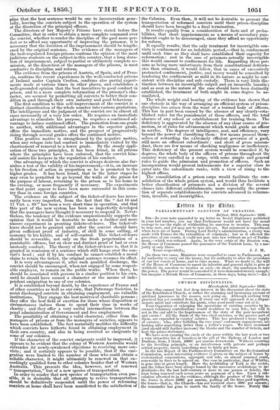tottfts to tO ttitnr.
PARLIAMENTARY SA.ECTION OF TREATIES.
Belfast, 29th September 1856.
But—In your note appended to my letter on Secret Diplomacy published in your last number, you say. that Parliament would not have the moral courage to use the right of withholding its sanction to treaties. This may be true now, and yet may not be true always. But argument is superfluous when facts are at hand. During Lord Derby's administration, a treaty was made with France for the extradition of criminals; but as it affected the procedure of our courts, it could not pass into law without an act of Perlis- ment,—which was refused. Again, in the very crisis of the Russian war, the House of Commons passed the guarantee of the Turkish Loan, by a ma- jority of only three.
[In these two cases, Ministers were compelled to come to Parliament, not for authority to carry out the treaty, but for authority to alter the procedure of our law courts at home, and to raise money. What we doubt is, the will of the House of Commons to assert its inherent and general right to give or withhold its sanction to treaties as such—in Short, the resolution to take the power. The power would be conceded if it were demanded sternly enough: but imagine a British House of Commons, in these days, being stern !—En.]


































 Previous page
Previous page